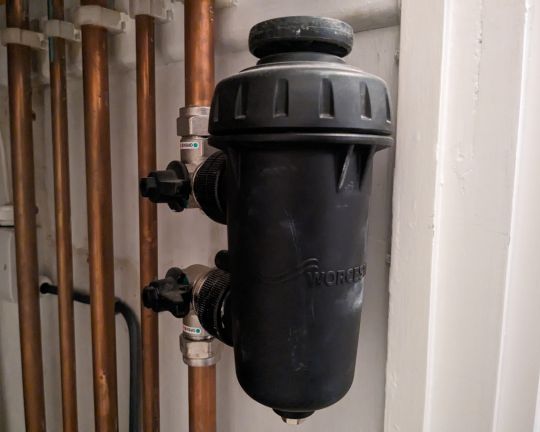Boiler how-to
How to clean a boiler filter
22 Apr 2024 • 4 minutes


Your boiler filter (or central heating filter) is an important component that keeps any sludge and other unwanted debris from entering your boiler.
In this guide we’ll go through the steps you can take to clean your boiler filter and make sure that it works to its full potential.
As we touched on in our intro, the job of the boiler filter is to stop all the unwanted bits that float around in your pipes from entering your boiler. This can include anything from sludge and debris, to rust that can collect in your pipes as they corrode.
They can operate in different ways. Some will use a strong magnet to help attract all of the waterborne particles, while others have a centrifugal (or whirlpool) action that helps separate the dirt and particles from the water.
Whichever type of filter you have, we recommend that you have it checked when you have your boiler serviced. The engineer will ensure that the filter is clear and that your heating is working efficiently.
The cleaning of the filter on a boiler is usually done by an engineer as part of a boiler service. However, if you’re feeling confident in taking this on as a DIY job, depending on which filter you have, you can follow the steps below to get this cleaned properly.
Before you try to reset your boiler check the following:
The professional advice on cleaning your boiler filter is once a year. This will help prolong the life of your boiler and stop any debris from causing a problem, such as a boiler breakdown, or worse still, a full boiler replacement.
Magnetic filters aren’t essential, but as we’ve mentioned, if you want to help your boiler last a bit longer and lower the costs of your heating bills each month, then it’s recommended that you have one.
Without one the build up of rust and debris is more likely, which will put the efficiency of your boiler at risk.
If cleaning your boiler filter feels like a step too far, then one of our Home Experts can take a look over your boiler for you when you book a gas boiler service.
You can do this, and take a look at our boiler cover options by visiting the boiler cover page on our website.
Our help & advice articles cover Plumbing, Home heating, Electrical, Energy-saving and Home maintenance.